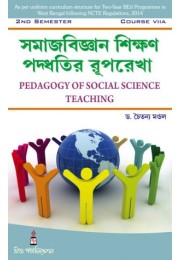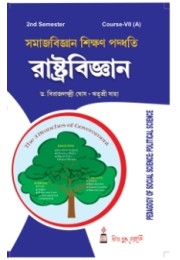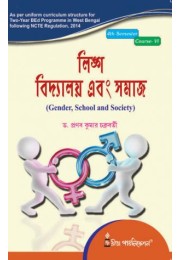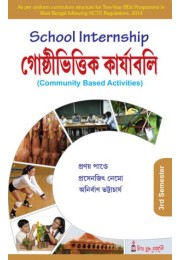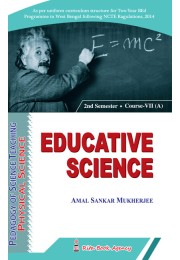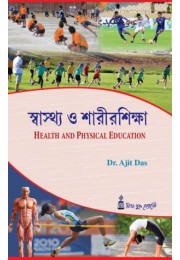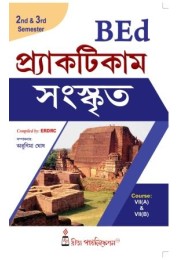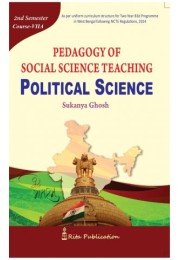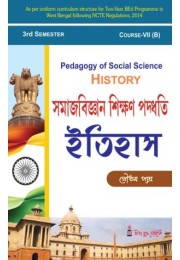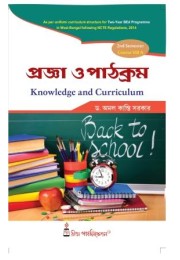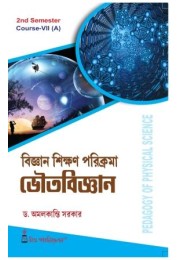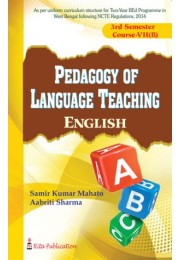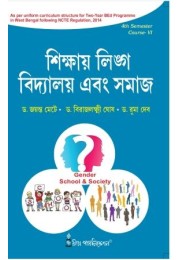READING AND REFLECTING ON TEXTS (EPC-1)
Rs.304.00Rs.320.00
Author: DR.MALAYENDU DINDA
Availability: In Stock
Publisher: Rita Publication

1. Introduction to Reading
Reading—Meaning and Process 1; Reading Process at a glance
Models of Reading Process —(i) Bottom-up approaches model ; (ii) Top-down approaches model; (iii) Interactive approaches model ;
(iv) Schema Theory & Reading
Schema Theory —Introduction ; Types of Schema —(i) Linguistic Schemata ;
(ii) Formal Schemata ; (iii) Content Schemata —Schema Theory and Reading Comprehension —Three types of schemata and reading comprehension —(i) Linguistic Schemata and Reading Comprehension ; (ii) Formal Schemata and Reading Comprehension ; (iii) Content Schemata and Reading Comprehension —More Definitions of Reading ; Process of Reading
Importance of Reading Across Curriculum .
Characteristics of Reading —The Pace of Reading ;
2. Reading Skills
Levels of Reading —Literal Inter-pretative , Critical and Creative .
Types of Reading —Intensive Reading ; Extensive Reading ; Oral Loud Reading ; Silent Reading or Reading for meaning .
Reading Techniques—Skimming and Scanning—Skim Scan
Methodology of Reading—1. Methodology of Word Recognition (decoding) Stage and Phase Models of the Development of Reading; 2.Methodology of Comprehension /Reading Comprehension including Metacognition a)Inference Making (b) Metacognition (c) Understanding Text Structure—Methodology of Reading The perceptual Span in Reading and the Use of Parafoveal Information ; Reading by Ear or by Eye–; Methodology of Teaching Reading for Word Perception (i) The Alphabetic Method ; (ii) The Phonic Method ; (iii) The Whole Word Method ; (iv) Sentence Method ; (v) The story Method–; (vi) An Eclectic Method ; Teaching Reading in a non-alphabetic language–Chinese ;
3. Reading the Text
Types of Texts—(i)Descriptive(ii)Narrative(iii)Expository(iv) Argumentative(v)Persuasive(vi)Reflective (vii) Interpretative
Types of text: According to Nature —
(i) Suggestive ; (ii) Empirical ; (iii) Conceptual .
Types of Texts: According to form 109—
(i) Test on Ethnography ; (ii) Policy Document ; (iii) Field Notes .
Making Sense of a Text .
Importance of Different Texts in Curriculum —(a) Non-prose text ; (b) Expository (c) Fiction, poetry, novel and short story
4. Reading Comprehension
Reading Comprehension — Defining Reading Comprehension ; Texts Readers ; Task ; Integrating information about Reader, Text and Task Theories of Reading Comprehension ; Developing Reading Comprehension ; Strategies thatWork—
(i)Activelistening;
(ii) Comprehension monitoring ; (iii) Activating Prior knowledge ; (iv) Mental imagery
(v) Mnemonics ; (vi) Graphic organizers ; (vii) Text structure / Story structure ;
(viii) Question answering (ix) Question generation ; (x) Summarization
Developing Vocabulary for Reading —Vocabulary as a language skill required for comprehension
Techniques of Developing Vocabulary —Classroom techniques —A. Using objects
B. Using gestures and symbols ; C. Using known vocabulary ; D. Using word categories
E. Definition and para-phrase ; F. Using the mother tongue ; G. Finding meanings from the context ; H. Semantic grouping ; Semantic Map ; Word-Map & Concept Map —Sustaining Ambiguity .
Problems of Reading 146—(i) Problems related to Mechanics of Reading (ii) Faulty Reading Habits ; (iii) Miscues or Decoding Errors (iv) Vision Loss ; (v) Problems that Learners Face while Reading —Reasons for Com-prehension Failure ; (vi) Reading Handicaps —Developmental Dyslexia .
5. Developing Reading Skills
Developing Critical Reading Skills—Strategies for Critical Reading; Three popular techniques for developing critical reading—
(i) SQ3R Technique (Robinson); (ii) SCROL Procedure Summary of the SCROL procedure (iii) Think-aloud techniques in critical reading
(iv) Structure-proposition-Evaluation (SPE) Method, (v) Multiple Intelligence based Method
Developing Reflective Skills.
Developing Metacognition in Reading.
Activities for Developing Reading Skills—Type of Reading Comprehension Activity; Different Forms of Reading Activities—Comprehension Exercises
Types of comprehension exercises—Questions;
(i) Fixed Response Items; (ii) Free Response Items ..


